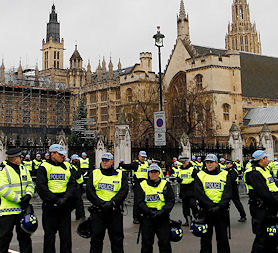Plans for elected police commissioners unveiled
In a shake-up that could cost more than £130m to set up and run in the first year, plans to replace police authorities with elected commissioners are published by the government.

Police and crime commissioners will oversee multimillion-pound budgets and have the power to sack chief constables.
The Police Minister Nick Herbert said the new commissioners would “replace weak and invisible police authorities”, giving the public “a greater say over how their community is policed, making forces truly accountable to the communities they serve, and ensuring that the police are crime fighters and not form writers”.
Replace weak and invisible police authorities
Police Minister Nick Herbert
But his Labour Shadow Vernon Coaker said: “A single elected police chief for an area as large as the West Midlands, Greater Manchester or Devon and Cornwall will do little to improve police accountability, but will risk politicising the police and at a huge cost to the public.”
Concerns about the wide geographical areas commissioners will be expected to cover were also raised in a report from the all-party Home Affairs Select Committee, published today.
Policing charter
Chairman Keith Vaz said: “We recommend a policing charter which will define clearly and precisely where the writ of the commissioner ends and the responsibility of the chief constable begins.
“In abolishing police authorities and introducing directly-elected police and crime commissioners, the Government is placing a huge responsibility on these individuals.”
“Greater cost”
Rob Garnham, chairman of the Association of Police Authorities, said: “At present, 17 members, including nine elected councillors and eight independent members of the community, share the work of holding the force to account and managing finances.”
“A single individual would need a significant number of support staff to enable him or her to be as effective as the current model.
“This would essentially mean employing staff to carry out the work that police authority members do now, but at a much greater cost.”
Paid £122,000
Commissioners, who will oversee forces in England and Wales apart from London, will be paid about £122,000 a year.
The government argues that they will improve local accountability because they are elected.
The Police Reform and Social Responsibility Bill also includes plans to replace the Serious Organised Crime Agency (SOCA), set up by Labour, and overhaul the licensing laws.
Licensing laws
There will be tougher penalties for serving under-age drinkers, with fines doubled to £20,000 for persistent offenders, while licensing authorities will be able to charge late-night drinking premises a levy to cover the cost of additional policing.
Police constables will retain responsibility for “the direction and control of the police force”, but will be accountable to commissioners.